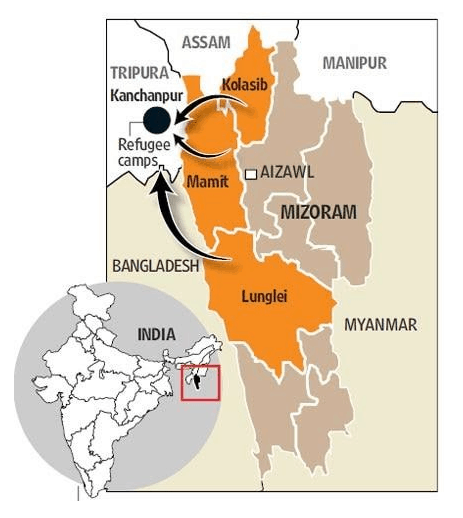UPSC Articles
Indian Federalism
Topic: General Studies 2:
- Functions and responsibilities of the Union and the States, issues and challenges pertaining to the federal structure
Bru Refugees

Daily Current Affairs IAS | UPSC Prelims and Mains Exam – 20th January 2020
Context:
The quadripartite agreement signed between Centre, State government of Tripura & Mizoram and representatives of Brus Organisation to settle Brus refugees in Tripura.
Who are Brus?
- The Brus, also referred to as the Reangs, are spread across the north-eastern states of Tripura, Assam, Manipur, and Mizoram. Reangs or Brus are the second largest ethnic group in Mizoram.
- They are ethnically different from the Mizos, with their own distinct language and dialect
- In Tripura, they are recognised as a Particularly Vulnerable Tribal Group (PVTG).
Conflict in Mizoram:
- In 1995, Mizos, the majority tribe of the state of Mizoram, demanded that Brus be left out of the state’s electoral rolls as they contended that they are not indigenous to Mizoram.
- In 1997, ethnic violence forced roughly half the Bru population to flee the state in large numbers to neighbouring Tripura.
- Their exodus in 1997 was spurred by violent clashes in Mamith subdivision, a Reang-dominated area, when they demanded creation of an Autonomous District Council (ADC), under the 6th Schedule of the Constitution, in western Mizoram that was vehemently opposed by Mizo groups.
- Currently, around 35,000 (more than 5,000 families) Bru refugees living in Tripura camps.
Progress over past two decades
- The Centre and the two State governments involved made nine attempts to resettle the Brus in Mizoram. The first was in November 2010 when 1,622 Bru families with 8,573 members went back. Protests by Mizos stalled the process in subsequent years.
- In June 2018, Bru leaders (Mizoram Bru Displaced People’s Forum- MBDPF) signed an agreement in Delhi with the Centre and the two state governments, providing for repatriation to Mizoram (deadline to move back to Mizoram was set as Sep 2020) along with rehabilitation package (free ration, housing assistance, education)
- However, the camp residents said the package did not guarantee their safety in Mizoram, and were not happy with the deadline (to repatriate to Mizoram) provided by the government. Thus fear of repeat of the violence lead to the failure of agreement.
How is this agreement different from the earlier initiatives taken for the Bru?
- Allows Bru refugees to permanently settle in Tripura if they want to stay on. They will be provided voting rights in Tripura. The Bru who returned to Mizoram in the eight phases of repatriation since 2009, cannot, however, come back to Tripura.
- Fresh Survey: To ascertain the number of those settled in relief camps
- Special developmental package in addition to the Rs 600 crore fund announced for the process, including benefits for the migrants.
- Rehabilitation Package: Each family will get 0.03 acre (1.5 ganda) of land for building a home, Rs 1.5 lakh as housing assistance, and Rs 4 lakh as a one-time cash benefit for sustenance
- They will also receive a monthly allowance of Rs 5,000,(through Aadhar enabled Direct Benefit Transfer) and free rations for two years from the date of resettlement.
- Timeline provided: All Bru refugees will be moved to resettlement locations in four clusters, paving the way for the closure of the temporary camps within 180 days of the signing of the agreement and housing & payments completed with 270 days.
Role of Tripura’s erstwhile royal family
- Pradyot Kishore Debbarma, scion of Tripura’s erstwhile royal family, claimes that the Bru were originally from Tripura, and had migrated to Mizoram after their homes were flooded due to the commissioning of the Dumboor hydroelectric power project in South Tripura in 1976
- This effort by a socially respected person led to easy acceptance of Brus by Mizoram political system.
- Pradyot Deb Barman, who is also one of the signatories, committed to donate 35 acres of land for the purpos, thus easing the pressure on government in their search for land.
Concerns/Challenges:
- It could set a bad precedent and “legitimise” the ejection of minority communities by ethnocentric states.
- The displaced Brus who returned to Mizoram have already begun demanding a package equivalent to the one those who stayed behind in the Tripura relief camps
- It could fuel conflict with the locals of Tripura (between Brus and Bengali non-tribal people)
- Forests would be razed down so as to provide the land needed for settling Brus. Nearly 162 acres will be needed for the process and since Tripura is a small state, the government would look to diversion of forest land for human settlement purpose.
Connecting the dots
- Naga issues and its linkage with states of Manipur and Arunachal Pradesh
- Cooperative Federalism
- Other internal refugees in India – Kashmiri Pandits














